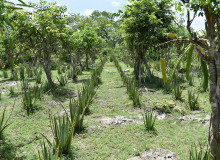traditional ecological knowledge
Indigenous Correspondents Program | University of Arizona
In this podcast, Nadira Mitchell, a Diné student studying natural resources and wildlife conservation, weaves an oral story about snails in the Sonoran desert, Diné culture, traditional ecological knowledge, and science.
Planet Forward Senior Correspondent | American University
Milpa is a type of sustainable farming historically practiced by the Maya in the Yucatán and other parts of Mesoamerica. The milpas, planted with numerous crops for local consumption, are facing challenges from climate change.
SUNY College of Environmental Science and Forestry
Is agriculture inherently exploitative and destructive, or can we learn a new way from the traditional ecological knowledge of indigenous cultures?

